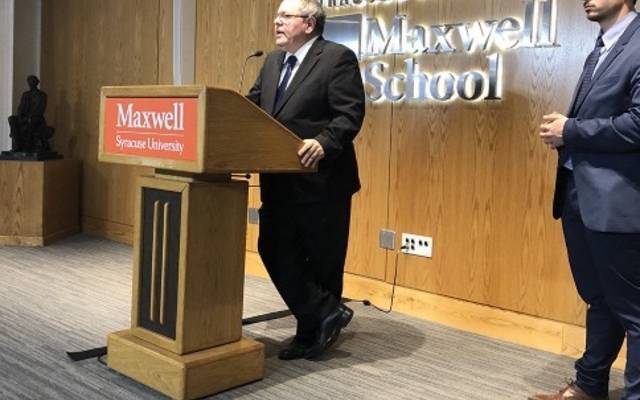So much for academic freedom and open discourse. Anti-Israel activists attempted to silence Israel’s consul general in New York during a speech at Syracuse University.
By: Shiri Moshe/The Algemeiner
Some 20 protesters disrupted a speech by an Israeli ambassador at Syracuse University in New York on Tuesday, raising concerns about efforts to chill free speech on campus.
Dani Dayan, Israel’s consul general in New York, began addressing around 100 audience members during an event exploring the future of the Middle East when a group of protesters situated outside the lecture hall started chanting loudly in an attempt “to drown out the talk,” Miriam Elman, an associate professor of political science at Syracuse, told The Algemeiner on Wednesday.
Elman, who attended and helped organize Dayan’s lecture, said the protesters — among whom were both students and professional activists — had assembled in advance underneath the windows of the event room, holding posters claiming “Zionism = Racism,” “Judaism Rejects Zionism,” and endorsing the boycott, divestment, and sanctions (BDS) campaign against Israel. “They were quiet,” she noted. “They talked to people who came by. Nothing wrong with that.”
But the chanting started as soon as the event commenced at noon — and escalated about three minutes into Dayan’s speech, when Ariel Gold, a campaign director for the far-left activist group Code Pink who sat among the audience members, stood and unfurled a banner reading, “Free Palestine.”
“Dani Dayan, you have blood on your hands,” Gold shouted at the ambassador, according to video footage. “Israeli settlements are entirely illegal under international law,” she continued.
Dayan is a former chairman of the Yesha Council, which advocates on behalf of Israeli settlements in the West Bank.
Gold was promptly removed by campus security, but her chants were echoed seconds later by Ursula Rozum, a member of the anti-war Syracuse Peace Council’s Justice for Palestine Committee.
“Free Palestine, end the bloodshed in Gaza,” shouted Rozum as she was escorted out. “Sanctions now, Dayan is an international criminal.”
While the room settled down shortly afterwards, the chanting outside the lecture hall intensified.
“It was still disruptive and hard to hear Dayan,” Elman recalled. The chanting continued increasing in volume until the protesters, led by Gold and Rozum, had entered the building and continued their demonstration directly outside the event room.
Associate Dean of the Maxwell School Carol Faulkner, who introduced Dayan, took the opportunity to ask the protesters to civilly join the event and ask questions at its conclusion. “They shouted in her face,” Elman said.
Gold was then forcibly removed from the building by a Syracuse safety official, and the protesters followed.
Disruptions Aimed at Silencing Speakers and Intimidating Students
Despite the disruptions, “the talk was well received [and] there were tough questions,” Elman said. Dayan took pictures with students and said on Twitter that he had “excellent meetings” earlier in the day with Syracuse University deans.
Nonetheless, the incident disturbed some members of the campus community.
“A few of the Jewish students who had also gone to the public talk … told me how ‘shaken up’ they were by what had happened,” Elman shared. “They were really upset that the talk was disrupted and also by the level of vitriol. One student especially mentioned the signs that were held during the protest — he said it wasn’t really protesting Israel’s policies but was anti-Zionist and even anti-Jewish.”
She expressed hope that the university would publicly recognize that while peaceful protests of campus events are legitimate, they would not be tolerated “when they descend into disruptions aimed at silencing speakers and intimidating students.”
Elman pointedly observed that Syracuse hosted a public screening and workshop with Palestinian director Mai Masri on campus last week, which was not “shut down or disrupted in any way.”
“We can disagree over the content of speech and there is a process for voicing that disagreement on campus — and pro-Israel students follow and adhere to those rules,” she said. “But yesterday, anti-Israel students did not.”
Jewish and pro-Israel campus groups have frequently complained that anti-Zionist students disrupt their programs with vocal protests meant to shut down dialogue.
A September report published by the Israel on Campus Coalition advocacy group on the 2016-2017 academic year found that BDS activists repeatedly engaged in “hostile disruptions of pro-Israel events, deliberately interfering with lectures and educational activities.”
“On several campuses,” the report noted, “protesters shouted down Israeli speakers and other guest lecturers, attempting to silence pro-Israel voices.”
